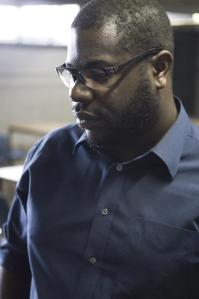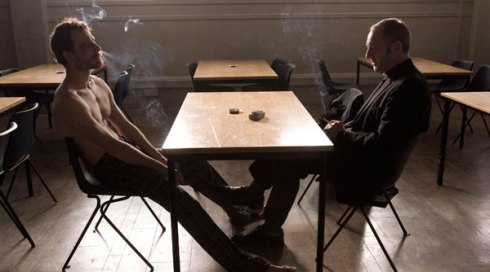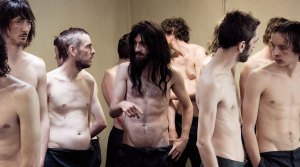 Hunger is a movie with little in the way of contextualisation. We are thrown into direct confrontation with the characters, imprisoned members of the Provisional Irish Republic Army who undertook a horrific and fatal hunger strike in 1981. Set mainly in the total institution of prison, very little effort is made to humanise either the guards or the prisoners. They simply exist in a state of dull suffering punctuated by moments of exceptional brutality. Hunger is very violent, but it is without the sexualised gratuity and scopophilic delight often, explicitly or implicitly, utilised by other films. The loneliness is palpable, from the guard who eats alone, either ignored or ignoring, to the two prisoners locked isolation cells and offering little verbal relief to each or the viewer. Both are trapped; the prison guards by duty of employment and the prisoners by belief and physical incarceration.
Hunger is a movie with little in the way of contextualisation. We are thrown into direct confrontation with the characters, imprisoned members of the Provisional Irish Republic Army who undertook a horrific and fatal hunger strike in 1981. Set mainly in the total institution of prison, very little effort is made to humanise either the guards or the prisoners. They simply exist in a state of dull suffering punctuated by moments of exceptional brutality. Hunger is very violent, but it is without the sexualised gratuity and scopophilic delight often, explicitly or implicitly, utilised by other films. The loneliness is palpable, from the guard who eats alone, either ignored or ignoring, to the two prisoners locked isolation cells and offering little verbal relief to each or the viewer. Both are trapped; the prison guards by duty of employment and the prisoners by belief and physical incarceration.
Steve McQueen, is an accomplished video artist and Turner prize winner, not to be confused with the 1960s movie star. In his firs t feature film, he offers a lens which is harsh, but which has a soft eye for detail. When a guard has a cigarette outside after a prison bashing, his face set in a scowl of disgust, snow falls sublimely slowly in front him, offering a purifying cloak to a dark moment of self reflection. The isolation cells, with its walls covered in piss, shit and blood, look like, and are later turned into, a piece of abstract expressionism, while also highlighting the inhumanity experienced by these prisoners.
t feature film, he offers a lens which is harsh, but which has a soft eye for detail. When a guard has a cigarette outside after a prison bashing, his face set in a scowl of disgust, snow falls sublimely slowly in front him, offering a purifying cloak to a dark moment of self reflection. The isolation cells, with its walls covered in piss, shit and blood, look like, and are later turned into, a piece of abstract expressionism, while also highlighting the inhumanity experienced by these prisoners.
McQueen won the Camera d’Or (best first time director) for Hunger at Cannes this year and it’s clearly warranted; a 20 minute, one-shot, take with Bobby Sands (Michael Fassbender) in which he justifies, to a Catholic priest, his beliefs and determination to starve himself to death is a truly exceptional cinematic moment. Learning and reciting with naturalism such a long tract of dialogue is just one of the ways the director has pushed his actors. Bobby Sands undergoes a grotesque and dramatic transformation as his body decomposes in front of the viewer, which took two months off camera preparation by actor Fassbinder. The denial of the prisoners ‘to wear the clothes of a criminal’ results in the cast spending the entire film clothed in rags.

The incredible central scene
Hunger is a disturbing, unsentimental portrait of modern Martyrdom. It’s outside the traditional biopic genre, offering little in th

Hungry
e way of political contextualisation, apart from the odd, archived audio polemics of Margaret Thatcher and the obligatory pre-credits white-sentences-on-black-background epilogue. Mcqueen, on the basis of Edna Walsh’s script, selects a more visceral approach which is likely to leave the viewer unsettled and frustrated. We are as cut off as the prisoners, who practically have no ability to update themselves on the social and political and milieu that put them there. The starkness of the situation demands a humanitarian response, and is timely in light of Australia’s part in the denial of political rights and inhumane incarceration of modern day terrorists.
-Steve McQueen in Interview magazine
–Steve McQueen interviewed about hunger in Time out Sydney
–Current exhibition (‘Queen and Country: war portrait stamp project) {2}
Ronan MacEwan
First Published 2008
Short interview with Steve.
